HIT CHANNEL EXCLUSIVE INTERVIEW: October 2012. We had the great honour to talk with a legendary guitarist and a fine person: John McLaughlin. He is a pioneer of jazz fusion and he has made numerous groundbreaking albums in his career with his own Mahavishnu Orchestra, with Miles Davis, Tony Williams Lifetime, Shakti and as a solo artist. Also, he has influenced countless guitar players in many genres and Jeff Beck called him “the best guitarist alive”. The latest album of John McLaughlin And The 4th Dimension, “Now Here This”, will be released on 16th October by Abstract Logix and online through www.mediastarz.com Every music lover should listen to it! Read below the very interesting things he told us:
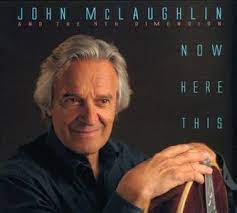 Are you satisfied with the final result of “Now Here This” album?
Are you satisfied with the final result of “Now Here This” album?
I’m very happy with this recording. I think the band never sounded better. We recorded it in mid December. The record will come out now, because I had many other things to do. I was touring with Shakti in India, in February, and then with The 4th Dimension (ed: with Indian drummer Ranjit Barot, Cameroon-born/Paris-resident bassist Etienne M’Bappe and keyboardist/drummer Gary Husband ) in Ukraine in early May and then with Shakti in Russia. Two weeks ago, we were in America with The 4th Dimension and in the end of this month we will leave for a European tour. So, we are very busy and what I had to do is a mix in between tours, and that’s wonderful. I’m very happy with the mix and the performance. Because the great thing about studio recordings is that you can play more than one take, you can play a tune 3, 4, 5 times if you like, until everybody is happy with what you play. This record is, I think, that best thing I ever did, from the beginning until today. I say it myself, but it’s great.
Did you try anything in the studio for the first time during “Now Here This” sessions?
No, I always record in the same way: live in the studio. Because of the kind of music we play, we need to have interaction. It’s very important to this music. Ofcourse, you can play lengthy guitar solos, a beat or a bass solo. A lot of people don’t want to do this, they want a “production”. In the kind of music we play, you can call it “jazz” or “jazz fusion” or “jazz rock”, the important thing is to play together. We have to play together. Once you have a good performance from everybody in the studio, then you can go and say “This is a great performance, and now I recorded it, I want to put the guitar behind the bass” for example. Because this is a studio, not a live recording. A live recording is like a photograph, isn’t it? A studio recording a little bit more like a painting. We can show things in the studio, but it’s more difficult to show them on stage. I like both for different reasons. I like the studio, but I like the live recordings ofcourse.
Are you anxious about how the new songs will be received by the fans during the upcoming tour?
(Laughs) Theodore, I’m recording for all my life. I have forgotten how many records I have made. From the beginning there are two things: First of all, I never have an intention to make a record. I always wait for the music to come, to have enough music and then I go to the studio. I have to say that I never go to the studio to make fans happy. I have to make me happy, I have to make the musicians happy and the musicians themselves have to be happy. You know you cannot please everybody all the time. But the most important for me and the musicians, is that I have to say the truth with the music. And when the music comes, I just try to get out of the way, and just write it how it comes. The same when you are improvising with the musicians, you can have a collective experience which is very beautiful. But we can only have the music, it can be enlightening, it can be some kind of experience of freedom, experience of spontaneity but in a collective way. These elements are very important to our music and we know, I know, that we can’t make everybody happy. I cannot , it’s not possible. I can make me happy, and I hope that somebody can enjoy. But if I make me happy -and I am my worst critic, believe me- I ‘m satisfied with my music and then, the people like or don’t like what I do. What I do is in God’s hands. We just hope, Theodore. We live in eternal hope.
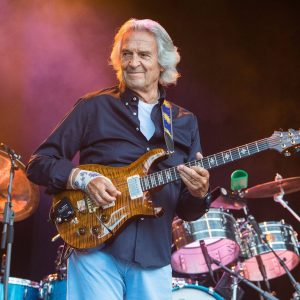 For “To The One” album, John Coltrane’s “A Love Supreme” was a major influence. Which albums influenced you for “Now Here This”?
For “To The One” album, John Coltrane’s “A Love Supreme” was a major influence. Which albums influenced you for “Now Here This”?
Ofcourse, I have my heroes: Coltrane is a hero, it’s like a guru for me. Miles (ed: Davis) too. I have my gurus, Theodore. I listen to them since I was 15 years old. And then Bill Evans, Sonny Rollins. Pianists like Herbie Hancock and Oscar Peterson. Great jazz musicians. They are always inspiring me when I listen to them. Then I listen ofcourse to ethnic music. I like very much ethnic much. I’m involved with ethnic music for many years, especially from India and Pakistan. Also, from Latin America, Hispanic influences. I feel very strong for the work I did with Paco de Lucia. They all had an effect on me. I get inspiration sometime listening to my iPod. In my iPod I have music of all kinds: I have music from Bach, music from Persian underground, Hawaiian music, music from The Eagles, I have Sly and the Family Stone, I have Jeff Beck, for me he’ s the best. I have a lot of things, that’s how I grew up in the ‘60s. I was playing rhythm & blues, I was trying to play jazz, and then in the studio I played rock and pop. All these influences, affected me and especially when I started to play with Miles, in 1969, and he was looking for new ways. I was very lucky, I was trying to bring out the things that were all around me. I listen to all kinds of music. I like listening toBartók, I know the great Greek composer Mikis Theodorakis and Iannis Xenakis. He was very famous is France. I know him for years. Not personally, I know his music.
Except your solo work with the 4th Dimension, are you planning any other projects to do in the near future?
Oh, yes. In March, I will go to India to make another CD with Shakti group. Shakti group is still alive and very active. You know, last year I did a reunion concert with Carlos Santana. We are in contact ofcourse, and maybe we will do another concert somewhere, I don’t know where, during next year, in 2013. I’ll do a charity concert in Prague, in end of November after the tour, with Zakir Hussein (Shakti). Just the two of us. I’m constantly working. In January I celebrated my 70th birthday. 70 years, you can imagine it? I feel like a 15-year-old hippie.
In May I talked to Ginger Baker (Cream, Blind Faith). He’s older and sicker. So, you ‘re very well.
I feel lucky and very healthy. I take care. I ride a bicycle a lot, and tennis and swimming. I have to. How old you’re, Theodore?
27.
(Ed: With surprise) 27?!?!?!
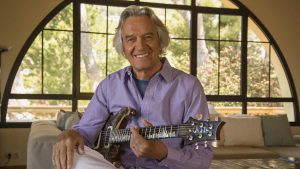 The same age you had when you started playing with Miles Davis.
The same age you had when you started playing with Miles Davis.
(Laughs) Yes, yeah! I have many things recorded and DVDs. For example, there is a wonderful recording of Paco (ed: de Lucia) and me, just the two of us, in Switzerland and I hope it will come out some day. I have another one from 1978, with One Truth Band, with Tony Smith,the drummer. What a great band! We never made a record with this band. A wonderful band, we have a fantastic video. We have a lot of live recordings. I have a live with Mahavishnu Orcherstra, “Live In Cleveland 1971”. Fantastic live and good recording! But PBS Sony didn’t want to put it out. I don’t know why. Maybe they wait for me to die. They think then they will sell more (laughs).
It’s silly.
Very silly. The recording industry is very bad. With all these pirates, we don’t make records, we don’t make money with records anymore. For many years now. I have painters friends, I know for them is very difficult too. But they don’t stop painting. Like me. When the music stops coming, then I will stop recording. As long as new music comes, then I’m happy.
At the 44th Montreux Jazz Festival in 2010, you played for the first after decades with Billy Cobham (drummer of Mahavishnu Orchestra). How much emotional was that show for you?
That was very nice, maybe because we hadn’t played together for 26-27 years. Do you know how it happened? I ‘ll tell you. The man who organizes the festival is Claude Nobs. Every year I go with my family to Montreux. Even I don’t have concerts, I go. We go because we to hike in the mountains. We walk up the mountains and then we go to the concerts at night. I like to ride a bicycle. I was in the other side of the lake in Switzerland and I got a call from Claude Nobs and he said “John, can you play tonight?”, I said “I don’t have a guitar”. He said “I have many guitars”, “Ok, I will play”. “I will call to Billy Cobham, he’s one hour from here”. “Ok, we will be here, we will play”. You know that group, Roxy Music?
Yes, of course.
Roxy Music were the stars of the night, and then there was a group flying from Canada, but the airplane was broken in Canada. So, they couldn’t fly. Then Claude called us, and Billy and I, came on stage and played tunes from Mahavishnu. In the memory of what it is. Amazing though?
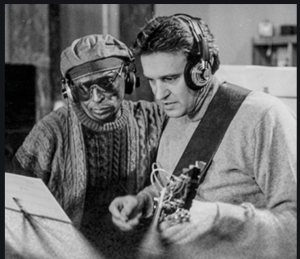 What is the most important thing you learned during the period you played with Miles Davis?
What is the most important thing you learned during the period you played with Miles Davis?
The most important thing I learned was how to lead a band. He is my guru since I was 15 years old, musically. Because Miles wasn’t just a fantastic musician and a great artist, he introduced new concepts. He introduced many concepts, he introduced the new way of playing back then. He influenced everybody, including Coltrane. And he was a phenomenon. And John (ed: Coltrane) ofcourse was a great musical influence all the way through the ‘60s and he still remains. When I started to play in concerts and in the studio with Miles, I realised what kind of genius he is. Because he had the capacity, to bring out of the musicians the best they can do and sometimes they could pull out of them what they didn’t even know they can do. He did it to me! More than once. Many times. I learned so much just being near him and with him, and seeing how he directed musicians in a way. He directed without directing. You know what I mean? He loved his musicians. And the musicians loved him. Everybody loved Miles. Even though, he had a different kind of reputation within journalists (laughs). But he could make fun of the journalists. With the musicians, he loved the musicians. And he took care of musicians. He took care of me. He made sure that I would survive. Sometimes, I would see him out of his house, outside somewhere, and he would ask me “Are you eating ok?” And he would put a 100-dollar bill into my pocket. He was a fantastic human being. When I worked with him, he was very committed to the music. Unbelievable. And this is the best thing I learned: how to get the best out of the musicians.
In 1979 you played at the Havana Jam with Tony Williams and Jaco Pastorius as Trio Of Doom. Do you remember anything from that show in Cuba?
You know, I remixed the record a few years back. I really missed them because they are both gone and I am the only left alive. I was very glad to Tony and Jaco. When I first met Tony was in January ’69 and we were friends all the way to time with Miles and Lifetime. Jaco, when he first came to New York, he came to see me. He was hoping to be in my band. It was 1973 or ’74 maybe, and we were rehearsing with Narada Michael Walden (ed: drummer of Mahavishnu and Jeff Beck) and Ralph Armstrong. And he walked in the studio and he said “I’m Jaco Pastorius, the greatest bass player in the world”. I said “Wow! That’s good news but I have already a wonderful bass player”. “Let me jam with you, but first can you give me 20 dollars because my car has flat tire” (laughs). I thought that this guy is amazing: he never met me before and he tells me that he is the best bass player in the world and if I can give him 20 dollars. Anyway, I gave him 20 dollars and I told him “Ok, come back and we will jam”. He went to fix his car, he came back and we played. And when he played I said “This guy is unbelievable”. But at the same time, I had Ralph Armstrong, a fantastic bass player. I didn’t want to change. The same night, I called Tony Williams and I said “Tony, you have to see this guy Jaco, he’s unreal. He’s unbelievable”. He started playing with Tony and from 1976, I was in the Shakti group and Shakti and Weather Report were playing everywhere together. It was a fantastic combination of groups. When Jaco and Tony started to do rehearsals, it was unbelievable.
Do you wish you have done more things with Trio of Doom?
Ofcourse. But there was a big fight between Jaco and Tony. It was really a shame because they were two revolutionaries, but there was fight. Maybe because they were too similar. Not fight, fight, but a dispute. I could do nothing. Nobody could do anything. They had to decide if they are friends or not. After the Havana Jam, we went in the studio and we recorded more music, but again there was a fight. Both were beautiful guys but very temperamental. Artists with temperament. And very susceptible. Anyway, at least the rehearsals were fantastic. It was amazing. Also, the concert was a beautiful thing. And in the studio, too. But it was a difficult mix, because some overhead microphones were not on. I know it sounds strange, but we fixed it. I didn’t earn any money. I said to Sony “You won’t give me any money for this, but I will fix it correctly. I’m the only one alive here from this band”. And I directed all the money to Jaco ’s widow and Tony ’s widow. After the mix, I sent some CDs to Tracy, Jaco’s widow and to Colleen, Tony’s widow. Colleen wrote back, she said “Thank you, thank you John for making this record because it’s so important that you do it” and I was very happy that she enjoyed the music of her husband. I played with Tony from 1969 until the end of 1970 exclusively. No, I was playing with Miles, but we were playing a lot together. Miles loved Tony. I remember him saying to me: “Nobody ever played like Tony before and nobody ever played like Tony since”. Jaco was superb. He changed the bass forever. Even in pop music you hear Jaco influence.
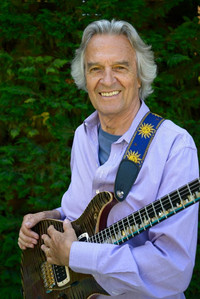 Even in pop music you hear John McLaughlin influence.
Even in pop music you hear John McLaughlin influence.
This I don’t know. Maybe in the heavy metal (laughs). I know people who tell me “John, John, I know some heavy metal guitar player who said ‘I love Mahavishnu Orchestra. Many years ago they influenced me’”. That’s nice, that’s fine. I like some heavy metal players, people like Eddie Van Halen. For me, he’s radical. I love this band. And this guy, the singer (ed: David Lee Roth), he’s pretty crazy. Eddie was a great player, he had a fantastic new technique.
Not very new. Steve Hackett from Genesis, was the first who did two-handed tapping. Eddie Van Halen just made it popular.
I know Allan Holdsworth had also this technique.
I think Steve Hackett was the first in rock. He did it in Genesis’ “Nursery Cryme” album (1971). I have talked to him.
I know this comes from Emmett Chapman, you know the Stick (ed: Chapman Stick)? Tony Levin from Peter Gabriel, did it many years ago. In fact, Tony Levin was the first person who called to join the first Mahavishnu Orchestra. He was playing at that time with Gary Burton, that’s why he couldn’t leave. I met him some years later and he was playing Stick with Peter Gabriel. He had that technique, you know “Sledgehammer”, using his right hand. You can see the evolution in electric guitar during the last 50 years. Jimi Hendrix and Eric Clapton, the two of them made amazing innovation with the electric guitar.
Do you like today the “Apocalypse” album by Mahavishnu Orchestra? George Martin (the legendary producer of The Beatles) has said that it was one the best records he had ever done.
(Laughs) I know he’s very sweet. I have to say “I love everything I do”, but every time I try to make the best possible. But this was a fantastic experience to work with George. Because I’m an old hippie as I said before. I grew up with The Beatles, from “Rubber Soul” I was a fan. Not before. But I loved the songs which started the psychedelic revolution. Everybody in Britain of course, the whole hippie movement. They were part of the psychedelic movement and from “Rubber Soul”, the music of The Beatles changed, and I became a fan at this point. Listening to the records and to their fantastic work, I realised that George Martin was the 5th Beatle.
Of course. Some songs are pure George Martin. Songs like “A Day In The Life” and “Eleanor Rigby” could be impossible to exist without George Martin.
Exactly! I agree. No, impossible! He had musical taste. Did you watch the documentary (“Produced by George Martin”)? It was very nice.
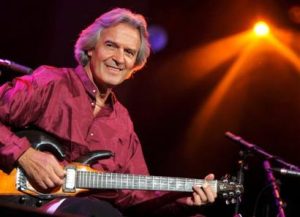 Yes. I have an autograph from him, too.
Yes. I have an autograph from him, too.
You have an autograph? He is such a lovely man, isn’t he? I wanted to work with a symphony orchestra. Who do I have to call? I have to call George Martin. He’s so good to work with him. I wasn’t very easy to work with a big electric band and a symphony orchestra. We were in two studios, with two-way videos. Our band didn’t ruin the balance of the orchestra. In those days, unlike today, everybody was recording at the same time. You can’t record first the band and then… You can, but I can’t think like this. It’s like putting an orchestra after, like overdubbing. We had Michael Tilson Thomas conducting. A fantastic experience. You know something, in November last year I was in New York with Chick (ed: Corea) and Five Peace Band, in his 70th birthday. And Gayle Moran came on stage and sang “Smile of the Beyond”, as she did in the album. She’s Chick’s wife now. In fact, I introduced them to each other almost 40 years ago. Crazy? She sang the piece that George played in the documentary. We hadn’t an orchestra but Chick has learned to play the orchestral part in his synthesizer. I hadn’t played this tune for 40 years. We played it and it was marvelous.
Did you have a good time at 2007 Crossroads Festival with Eric Clapton and Jeff Beck?
Ofcourse, ofcourse. Remember that: Eric and I, we know each other since 1966. We are really too old friends. He was with John Mayall’s Bluesbreakers and I was with the Georgie Fame Band. Then in London there were only 2 clubs: 100 Club and the Flamingo Club. And then ofcourse we met. Jeff, I know him from The Yardbirds. All the other guitar players I know too: Buddy Guy, B.B. King, Jimmie Vaughan. Have you seen the video? He (Ed: Eric) is doing a great thing. He does this festival for people who have problems with alcohol and drugs. We did one in Dallas (2004) and we did one in Chicago, three years later (2007).
With who musician did you have the best musical and spiritual connection on stage?
Oh, mygoodness! I have great connection with people from my band, Shakti. I have with all the musicians, with Chick Corea, with Paco de Lucia. I am fortunate because I have played music not only with great musicians, but also with great human beings. When you play with a great human being, you have a great possibility to have the experience I told you in the beginning. I talked about collective experience that happens in music. You cannot control it, but you can have it because of the kind of human beings who are on stage and make a great band and the music comes in a way transcendent. I have lived that experience with many musicians. For me the spiritual experience is the same as the musical experience. Both have the same character, it’s a universal experience. It’s an experience of unity.
You are a big fan of The Eagles and Mahavishnu Orchestra opened for them in a tour in late 1971. Do you remember that tour with The Eagles?
Are you kidding me? I love The Eagles!
That’s why I’m asking.
They are fantastic. They are a really great band. In the ‘60s and ‘70s it was great because I have done concerts opening for The Who, with Lifetime. Shakti did concerts with heavy metal bands like Iron Maiden. We have done concerts opening for comedians like George Carlin. We’ve done concerts with Aerosmith, with Blue Oyster Cult. I ‘ve done concerts opening for James Taylor. And for a very good guitar player, Leslie West. I like Leslie since I first listened to him, 41 years ago with his group Mountain. He was playing great. This isn’t happening any more. In those days agents could bring together these completely different bands. They had to be different because they wanted people to be exposed to different kinds of music. There was a very different attitude. The attitude was: “Ok, we have Mahavishnu Orchestra, let’s put them with The Eagles or James Taylor or a comedian”. With something completely different, not another jazz rock band. They looked for something completely opposite. Today if you are a jazz rock band, they will put you another jazz rock band. If you are a rap band, they will put you another rap band. If you are folk, they will put you with folk. They are very conservative today, just like the society. Terrible.
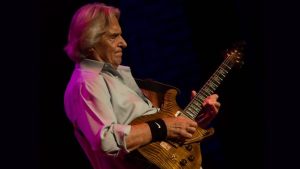 Now, there are more rules.
Now, there are more rules.
They are very boring. They don’t have imagination like we did in the ‘60s and ‘70s. Don’t forget those years were very crazy. People they were full of hope. They hoped to change the world in a positive way. The ‘60s and ‘70s were beautiful decades, Theodore. The problem today is that there is an unbelievable disgusting financial crisis. You know it better. People is just suffering. It isn’t that there is less money, it just goes to different pockets. Look what happened to America with 9/11, George Bush and the conservatives. The fundamentalist Christians, the fundamentalist Islamists. The fundamentalism is what a horrible bullshit. They used to be tolerant in the ‘60s and ‘70s. We ‘re different but we’re part of the world, we’re part of life. We can learn from everybody, but today everything is polarized. But the society is changing, the music is changing. Look to the jazz today, there isn’t good enough new jazz to inspire me. Some of the young people, I find that they are very conservative. Too cliché, too shallow. For me it’s a shame. Why I’m listening more to ethnic music? Because of the soul of these persons. Because of the light of their heart. I still enjoy my colleagues Chick, David Sanborn and Michael Brecker, who we lost him already a couple of years ago. But I don’t know about the young musicians. Yes, there are some guitar players like Jimmy Herring (Widespread Panic). I love him, he’s a very good guitar player. Eric Machacek (Fragile Existence) too. Decent young guitar players. I don’t know, I hope that the young generation has good players. But the industry has collapsed. Nobody gets a record contract. If you’re a young musician, or a jazz musician will you get a contract with a record company? Ofcourse not. Because they don’t sell records. People are downloading from Pirate Bay, from everywhere they can. So, the young players are really struggling, just to survive and to continue to play. Very difficult world at the moment. From many views. For you in Greece is the economy, and in America -two weeks ago, I was in America- it’s very bad too for a common man. It’s too bad. It’s very difficult today for a musician to make a career. For a good singer, maybe it’s easier. But it ‘s very different since I was young in the ‘60s and ‘70s. A different world, and much harder for the younger people. It’s a shame.
Jeff Beck has called you “the best guitarist alive” and many other people believe the same. Are you flattered when so great musicians admire your work?
Because I said that for myself he’s the best (laughs). In athletics, you can have the best, but in music it’s very personal. I love Jeff. We have toured together, we have player together many times. He’s my favourite guitar player. I like his capacity. He’s very sweet. I also watched Neal Schon (Journey) playing live. Beautiful. Great. Fantastic. You can only listening and enjoy. And Steve Morse (Deep Purple, Dixie Dregs), great guitar player. I think that we will change, Theodore. When things will start changing and economy starts going better, the attitudes will change. The society will be less conservative, more free like was in the ‘60s and ‘70s. It’s ultra conservative at this moment. Not healthy for music. Not healthy for anything in my opinion. But I think we will have to wait some years. There will be 4-5 years.
Do you have any memories from your jam with Jimi Hendrix at Record Plant Studios in March 1969?
Ofcourse, and I got to know him better when we spoke later. I met him several times later. What a lovely person. And I have to thank him for what he did for the guitar. What he did for the electric guitar, was so great. I think most of the electric guitar players today owe to Jimi Hendrix something. He did something with the electric guitar that nobody ever did. Nobody. I think he was influenced by Eric when we first came to the UK in the mid ‘60s. I think he heard Eric playing and it helped him. I’m not sure, I just believe so.
Jimi believed that Eric was the best guitarist in the world.
That doesn’t surprise me, because Eric did great things in the mid ‘60s. Look what he was doing with Cream. I was in a band with Jack Bruce and Ginger Baker, with Graham Bond, and when the band broke up, they got Eric and they made Cream. Eric was already a fantastic guitarist. For sure, he had a good impact on Jimi. And Jimi took that and transformed it even further. He was a revolutionary. He was fantastic. For me the jam, was wonderful. Was such a real pleasure.
You gave guitar lessons to Jimmy Page from Led Zeppelin. How was Jimmy as a student?
He was great! You know, I was 18, he was 17. I knew a little more about harmony and jazz. Also, I know John Paul Jones the bass player. I used to teach him harmony. We were in a rhythm and blues band together. Then I knew Jimmy. We knew each other because..
You were very famous session players.
Yeah, we all were session players because that was how we could survive. Playing pop and rock. But we had a lot of fun. When Jimmy and John Paul, made Led Zeppelin, wow!! It was fantastic.
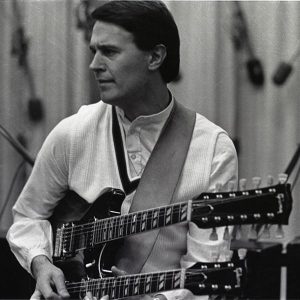 Do you remember the amazing face-to-face interview you gave to Robert Fripp from King Crimson in Paris in 1982 ?
Do you remember the amazing face-to-face interview you gave to Robert Fripp from King Crimson in Paris in 1982 ?
(Laughs) He ate all my candies!! A had a box of chocolate candies from the Basque coast and he ate everything. Can you imagine that?
The interview was very crazy. You were talking about what colour is E major, etc!!
Crazy guy.. but interesting. I didn’t know what he was doing is these days. Is he still playing?
He did a studio album recently (“A Scarcity of Miracles” by Jakszyk, Fripp & Collins), but he doesn’t tour. He has a legal battle against Universal Music.
This is a story I know. This is a story many musicians know.
A huge “THANK YOU” to Mr John McLaughlin for his time and to Mrs Ina for her valuable help.
Please check out www.johnmclaughlin.com and http://www.facebook.com/pages/John-McLaughlin/148685138488165

